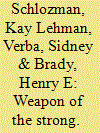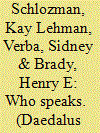| Srl | Item |
| 1 |
ID:
168077


|
|
|
| 2 |
ID:
097629


|
|
|
|
|
| Publication |
2010.
|
| Summary/Abstract |
What is the impact of the possibility of political participation on the Internet on long-standing patterns of participatory inequality in American politics? An August 2008 representative survey of Americans conducted by the Pew Internet and American Life Project provides little evidence that there has been any change in the extent to which political participation is stratified by socio-economic status, but it suggests that the web has ameliorated the well-known participatory deficit among those who have just joined the electorate. Even when only that subset of the population with Internet access is considered, participatory acts such as contributing to candidates, contacting officials, signing a political petition, or communicating with political groups are as stratified socio-economically when done on the web as when done offline. The story is different for stratification by age where historically younger people have been less engaged than older people in most forms of political participation. Young adults are much more likely than their elders to be comfortable with electronic technologies and to use the Internet, but among Internet users, the young are not especially politically active. How these trends play out in the future depends on what happens to the current Web-savvy younger generation and the cohorts that follow and on the rapidly developing political capacities of the Web. Stay logged on …
|
|
|
|
|
|
|
|
|
|
|
|
|
|
|
|
| 3 |
ID:
108869


|
|
|
|
|
| Publication |
2011.
|
| Summary/Abstract |
Using an August 2008 representative survey of Americans conducted by the Pew Internet & American Life Project, we investigate the consequences of Internet-based political activity for long-standing patterns of participatory inequality. There is little evidence of change in the extent to which political participation is stratified by socioeconomic status, even when we account for the fact that the well educated and affluent are more likely to be Internet users. However, because young adults are much more likely than their elders to be comfortable with electronic technologies and to use the Internet, the Web has ameliorated the well-known participatory deficit among those who have recently joined the electorate. Still, among Internet users, the young are not especially politically active. How these trends play out in the future depends on what happens to the current Web-savvy younger generation and the cohorts that follow as well as on the rapidly developing political capacities of the Web.
|
|
|
|
|
|
|
|
|
|
|
|
|
|
|
|